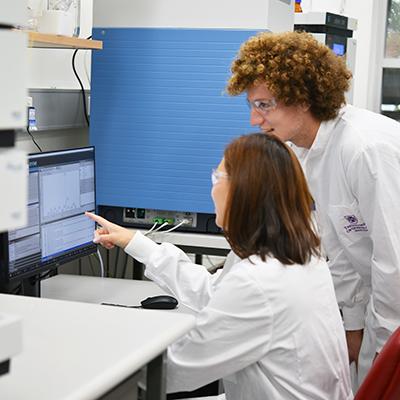
Credit: UQ AIBN
Greenhouse gas waste from factories could be turned into environmentally-friendly chemicals and fuels under an international project seeking to better understand the gene function of bacteria.
Dr Esteban Marcellin from The University of Queensland’s
Australian Institute for Bioengineering and Nanotechnology has secured funding for a large-scale study that will improve the efficiency of biofuel and chemical manufacture while recycling waste carbon.
Bringing together the ARC Centre of Excellence in Synthetic Biology, the US Department of Energy Joint Genome Institute (JGI), LanzaTech and Novo Nordisk Foundation Center for Biosustainability (DTU Biosustain), Dr Marcellin will investigate all 4000 genes of acetogen bacteria to better understand their metabolism.
Dr Marcellin uses anerobic bacteria or acetogens, which use carbon monoxide or carbon dioxide (CO2) to grow, to convert waste CO2 into useful chemicals and biofuels.
“Most of our chemicals are currently made from fossil fuels, but we are using recycled carbon to feed the bacteria, producing cleaner, greener chemicals and also using up gases which would usually contribute to climate change,” Dr Marcellin said.
The collaborators hope to learn exactly how all these bacteria make energy, with the goal to improve manufacturing efficiency and create a new way to make chemicals, bypassing fossil fuels.
“Understanding what all the genes do is a radical group effort, using cutting-edge automated genetic engineering and generating massive data sets which will need super-computers to analyse,” Dr Marcellin said.
DNA for the project will be synthesised at the Joint Genome Institute in the US, then applied at LanzaTech to knock out each gene individually, using their high throughput cutting-edge robotic technology.
“If we didn’t have this collaboration, it would take hundreds of PhD students and millions of dollars to make this happen,” Dr Marcellin said.
“Using the robots at LanzaTech’s biofoundry, we can automate this process, and it will take only a few years to complete this project.”
Professor Lars Nielsen’s group from DTU Biosustain, which specialises in analysing big data, will be responsible for making sense of the enormous amount of data the project will produce.
“The sheer volume of data generated in this study enables us to use advanced analytics to explore and explain the complex interaction between bacterial genes and their environment leading to the observed phenotype or behaviour,” Professor Nielsen said.
“Knowing the intricate details about the metabolism of these bacteria will help us improve their ability to transform greenhouse gas waste from factories into chemicals and fuels, and also encourage the bacteria to make an even wider variety of useful products.”
###
VIDEO – https:/
Media Contact
Jane Ilsley
[email protected]
Original Source
https:/




